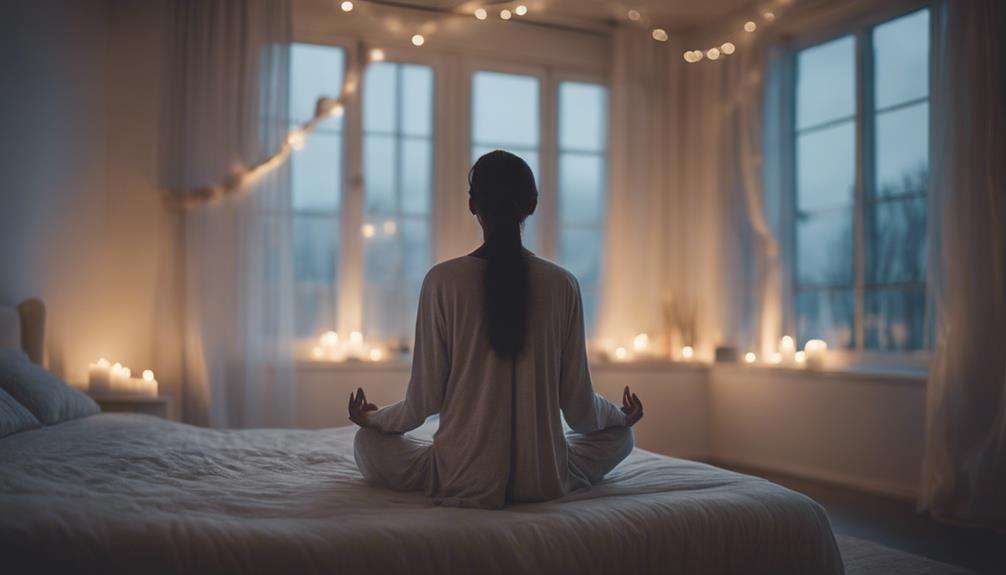If you've ever struggled to fall asleep due to a racing mind or stress, meditating before bed could be the solution you've been looking for. Imagine being able to unwind effortlessly, letting go of the day's worries, and slipping into a peaceful slumber within minutes.
But how exactly does this simple practice work its magic on your sleep quality? Stay tuned to discover the fascinating ways in which bedtime meditation can transform your nightly rest and overall well-being.
Key Takeaways
- Meditating before bed enhances sleep quality and reduces insomnia.
- Body scan and mindfulness meditation calm the mind and prepare for restful sleep.
- Yoga Nidra and bedtime routines improve sleep by inducing relaxation responses.
- Creating a comfortable sleep space and consistent bedtime meditation promote better sleep efficiency.
Benefits of Meditating Before Bed
Meditating before bed can significantly enhance your sleep quality and overall well-being by reducing insomnia and stress levels while invoking your body's relaxation response.
Engaging in mindfulness meditation or Yoga Nidra before hitting the hay can work wonders in preparing your mind and body for a restful night.
Techniques like body scan meditation help release tension from different body parts, easing you into a state of deep relaxation that's conducive to sleep.
Impact on Sleep Quality
Enhancing your sleep quality through bedtime meditation can lead to a more restful and rejuvenating night's rest. Meditation before bed has been shown to improve sleep by reducing insomnia and calming the mind and body.
Mindfulness meditation, in particular, can help decrease sleep disturbances, resulting in better overall sleep outcomes. By lowering stress levels and promoting relaxation, meditation creates an optimal mental state for falling asleep peacefully. This sense of calmness not only improves sleep quality but also enhances your overall well-being.
When you practice meditation before bed, you pave the way for decreased fatigue, increased relaxation, and positive pre-sleep thoughts. Techniques such as Yoga Nidra and gratitude meditation are especially beneficial as they induce a state of deep relaxation and calmness, setting the stage for a night of quality sleep.
Prioritizing meditation as part of your bedtime routine can significantly impact the quality of your sleep and ultimately your daily life.
Meditation Techniques for Better Sleep

If you struggle to unwind before bed, practicing breathing exercises can help relax your body and calm your mind.
Visualization techniques can create a peaceful mental space, easing you into a restful state.
Breathing Exercises for Relaxation
Engage in simple breathing exercises before bed to promote relaxation and improve your sleep quality. Deep breathing techniques can calm your nervous system, lower your heart rate, and reduce stress, helping you fall asleep faster.
Controlled breathing exercises before bedtime prepare your body for restorative sleep by inducing a state of relaxation. By focusing on your breath, you can quiet your mind, ease racing thoughts, and create a peaceful environment perfect for sleep.
Incorporating these breathing exercises into your bedtime routine signals your body to wind down, making it easier to transition into a restful night's sleep. Prioritizing these techniques can significantly enhance your overall sleep experience.
Visualization for Peaceful Mind
To further enhance your relaxation before bedtime, consider incorporating visualization techniques to cultivate a peaceful mind and improve your sleep quality. Visualizing peaceful scenes can calm the mind, reduce anxiety, and promote better sleep quality.
By engaging in visualization exercises, you can induce relaxation, strengthen the mind-body connection, and improve sleep onset latency. Studies have shown that visualization techniques before bed can create a positive pre-sleep mindset, leading to a more restful and rejuvenating sleep experience.
Try picturing serene landscapes, happy memories, or any calming imagery that resonates with you. This practice can help shift your focus away from stressors and prepare your mind and body for a restful night's sleep.
Mindfulness Meditation Practice
Engaging in mindfulness meditation before bed can work wonders for your sleep. By focusing on the present moment, you can ease into relaxation and signal your body that it's time to wind down.
This practice not only reduces stress but also paves the way for a more peaceful and restorative night's rest.
Benefits of Mindfulness Meditation
Mindfulness meditation practice enhances sleep quality by soothing the mind and reducing pre-sleep restlessness. Engaging in this practice offers various benefits for improving your sleep and overall well-being:
- Calming the Mind: Mindfulness meditation helps in calming the mind, reducing racing thoughts that often hinder falling asleep.
- Relaxation Response: By triggering the body's relaxation response, mindfulness meditation aids in falling asleep faster and more peacefully.
- Present Moment Awareness: Practicing mindfulness promotes present moment awareness, which can effectively reduce stress and anxiety levels, allowing for a more restful night's sleep.
Techniques for Better Sleep
Paving the way for a restful night's sleep, consider incorporating mindfulness meditation techniques into your bedtime routine. Engaging in mindfulness meditation before bed can improve sleep quality by calming the mind and reducing stress.
By focusing on the present moment, you can let go of racing thoughts that might hinder your ability to relax and fall asleep peacefully. This practice not only promotes relaxation but also enhances self-awareness and emotional regulation, crucial for achieving a tranquil state of mind before sleep.
Body Scan Meditation Benefits

When practicing body scan meditation, you can gradually shift your focus to each body part, fostering a deeper sense of relaxation and heightened awareness. This mindfulness practice allows you to tune into physical sensations, releasing tension and promoting overall relaxation. By engaging in body scan meditation, you enhance your body awareness, which can positively impact your sleep quality.
Here are some benefits of body scan meditation:
- Promotes relaxation
- Increases body awareness
- Releases tension
Research indicates that incorporating body scan meditation into your routine can lead to better sleep outcomes by facilitating deep relaxation and offering stress relief. Furthermore, this technique has shown promise in helping individuals manage insomnia more effectively. Embracing body scan meditation as part of your bedtime ritual can significantly contribute to improving your overall sleep quality.
Guided Meditation for Sleep
Considering the challenges of winding down before bedtime, incorporating guided meditation into your nightly routine can be a beneficial practice for enhancing relaxation and preparing your mind and body for restful sleep.
Guided meditation for sleep offers a structured approach to relaxation, guiding you through various techniques like breathing exercises, visualization, body scanning, and progressive muscle relaxation. These sessions are designed to promote calmness and tranquility, making it easier for you to transition into a peaceful sleep.
Research indicates that guided meditation can effectively reduce insomnia and improve the overall quality of your sleep. Additionally, there are numerous apps and online resources available that offer a wide range of guided meditation programs tailored specifically for enhancing sleep quality.
Yoga Nidra for Deep Sleep

To deepen your relaxation and enhance the quality of your sleep, consider incorporating Yoga Nidra, a form of meditation that promotes deep relaxation and conscious sleep. Yoga Nidra involves a guided practice focusing on body awareness, breath, and visualization techniques. By engaging in this practice, you can effectively reduce stress, anxiety, and insomnia, paving the way for a restful and rejuvenating sleep experience.
- Body Awareness: Through Yoga Nidra, you can develop a heightened sense of awareness of different parts of your body, allowing for deep relaxation to set in.
- Breath: The practice emphasizes the importance of mindful breathing, which can help calm the mind and prepare the body for sleep.
- Visualization Techniques: By incorporating visualizations during Yoga Nidra, you can create a serene mental space that promotes relaxation and eases you into a state of conscious sleep.
Creating a Relaxing Bedtime Routine
Establishing a relaxing bedtime routine can significantly improve your sleep quality and overall well-being. By dedicating time to wind down before bed, you signal to your mind and body that it's time to relax and prepare for rest.
Consistent bedtime rituals, such as meditation, help regulate your body's internal clock, leading to better sleep quality over time. Engaging in calming activities like meditation before sleep can reduce stress and anxiety levels, creating a soothing environment that promotes relaxation.
Setting up a comfortable and tranquil sleep space further enhances the effectiveness of your bedtime meditation practice. Incorporating meditation into your nightly routine can quiet the mind, release tension in the body, and facilitate a smoother transition into sleep.
Tips for Consistent Bedtime Meditation

To enhance your bedtime meditation practice and ensure consistency, it's valuable to establish a calming environment conducive to relaxation and inner peace. Here are some tips to help you maintain a consistent bedtime meditation routine:
- Create a Sacred Space: Designate a specific area in your bedroom or another quiet place for your meditation practice. This space should be free from distractions and clutter, promoting a sense of tranquility and focus.
- Set a Regular Schedule: Establish a fixed time each night for your bedtime meditation. Consistency helps signal your body that it's time to wind down and prepare for sleep, reducing stress and anxiety.
- Incorporate Relaxation Techniques: Before starting your meditation, engage in relaxation techniques such as deep breathing or gentle stretching to further promote calmness and improve sleep onset latency.
Research suggests that by following these tips for consistent bedtime meditation, you can enhance sleep efficiency, leading to a more restful and rejuvenating night's sleep.
Frequently Asked Questions
Does Meditating Before Bed Improve Sleep Quality?
Meditating before bed improves sleep quality by calming your mind and reducing stress. It enhances relaxation, promotes mindfulness, and helps regulate your sleep patterns. Prioritizing this bedtime routine supports your mental health and self-care benefits.
Why Do I Meditate Better at Night?
At night, meditating offers you a chance to unwind with a relaxation technique that eases stress, fosters a quiet mind, and enhances your bedtime routine. It nurtures the mind-body connection, providing a sleep aid and promoting deep breathing for evening calmness.
What Is the Science Behind Sleep Meditation?
When you meditate before bed, your brain waves shift, cortisol levels drop, and your body triggers the relaxation response. This process aligns with your circadian rhythm, boosts melatonin production, activates the parasympathetic nervous system, and improves sleep architecture.
Can Meditation Replace Sleep Entirely?
You can benefit from meditation by enhancing sleep quality, relieving insomnia, and relaxing your mind. However, it cannot replace sleep entirely. Sleep deprivation affects health, so balance meditation techniques with proper sleep for optimal well-being.
Conclusion
So, next time you hit the hay, remember to take a few moments to meditate before bed.
By calming your mind and body, you can improve your sleep quality and wake up feeling refreshed and rejuvenated.
Remember, the early bird catches the worm, so why not give meditation a try tonight for a peaceful night's sleep?
Sweet dreams await!






